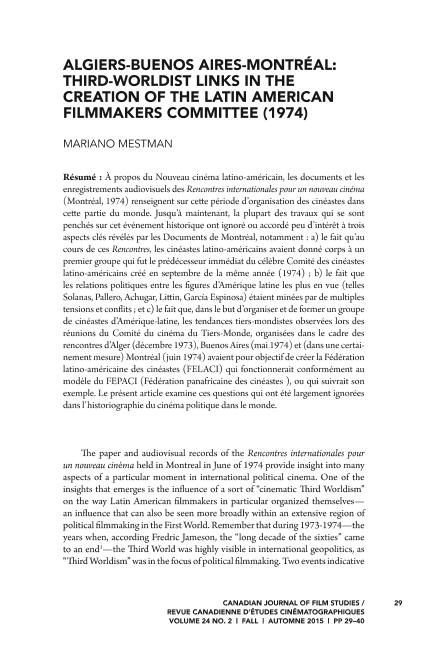Artículo
Algiers-Buenos Aires-Montréal: third worldist links in the creation of the Latin American Filmmakers Committee (1974)
Fecha de publicación:
08/2015
Editorial:
Film Studies Association of Canada / Association Canadienne d´ Ètudes Cinématographiques
Revista:
Canadian Journal of Film Studies
ISSN:
2561-424X
Idioma:
Inglés
Tipo de recurso:
Artículo publicado
Clasificación temática:
Resumen
In terms of the New Latin American Cinema, the documents and audiovisual records of the Rencontres international pour un nouveau cinéma provide insight into this period of organization of filmmakers in the region. In the most common accounts of this historical moment, three key aspects revealed in the Montréal Documents are often ignored or attributed little importance: a) the fact that during the Rencontres, Latin American filmmakers had given shape to an initial group that is the immediate predecessor of the renowned Latin American Filmmakers’ Committee created in September that same year (1974); b) that the political relations among the most well-known Latin American figures (like Solanas, Pallero, Achugar, Littin, García Espinosa) were wrought with tensions and conflict; and c) that within the goal of organizing and forming a group of Latin American filmmakers, the Third Worldist trends seen in the gatherings in the Third World Cinema Committee meetings of Algiers (December 1973) and Buenos Aires (May 1974) and (in some way also) Montréal (June 1974) were aimed at forming a Latin American Filmmakers Federation (FELACI) that would operate under or follow the example set by FEPACI (the Pan-African Federation of Filmmakers). This article focuses on these questions, which have been largely ignored in the film historiography of political cinema in the world. À propos du Nouveau cinéma latino-américain, les documents et les enregistrements audiovisuels des Rencontres internationales pour un nouveau cinéma (Montréal, 1974) renseignent sur cette période d’organisation des cinéastes dans cette partie du monde. Jusqu’à maintenant, la plupart des travaux qui se sont penchés sur ce moment historique du cinéma latino-américaine ont ignoré ou accordé peu d’intérêt à trois aspects clés révélés par les documents de Montréal, notamment : a) le fait qu’au cours de ces Rencontres, les cinéastes latino-américains avaient donné corps à un premier groupe qui fut le prédécesseur immédiat du célèbre Comité des cinéastes latino-américains créé en septembre de la même année (1974) ; b) le fait que les relations politiques entre les figures d’Amérique latine les plus en vue (telles Solanas, Pallero, Achugar, Littin, García Espinosa) étaient minées par de multiples tensions et conflits ; etc.) le fait que, dans le but d’organiser et de former un groupe de cinéastes d’Amérique-latine, les tendances tiers-mondistes observées lors des réunions du Comité du cinéma du Tiers-Monde, organisées dans le cadre des rencontres d’Alger (décembre 1973), Buenos Aires (mai 1974) et (dans une certainement mesure) Montréal (juin 1974) avaient pour objectif de créer la Fédération latino-américaine des cinéastes (FELACI) qui fonctionnerait conformément au modèle du FEPACI (Fédération panafricaine des cinéastes ), ou qui suivrait son exemple. Le présent article examine ces questions qui ont été largement ignorées dans l’historiographie du cinéma politique dans le monde.
Palabras clave:
Third Cinema
,
Latin America
,
Montreal
,
Political Film
Archivos asociados
Licencia
Identificadores
Colecciones
Articulos(SEDE CENTRAL)
Articulos de SEDE CENTRAL
Articulos de SEDE CENTRAL
Citación
Mestman, Mariano Ernesto; Algiers-Buenos Aires-Montréal: third worldist links in the creation of the Latin American Filmmakers Committee (1974); Film Studies Association of Canada / Association Canadienne d´ Ètudes Cinématographiques; Canadian Journal of Film Studies; 24; 2; 8-2015; 29-40
Compartir




